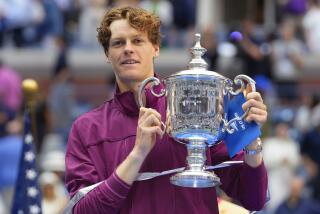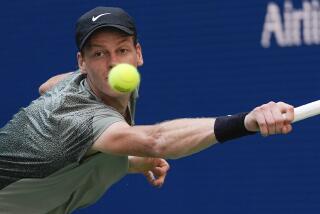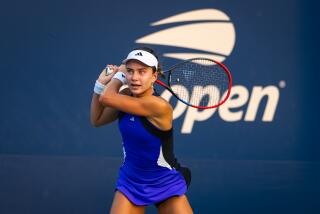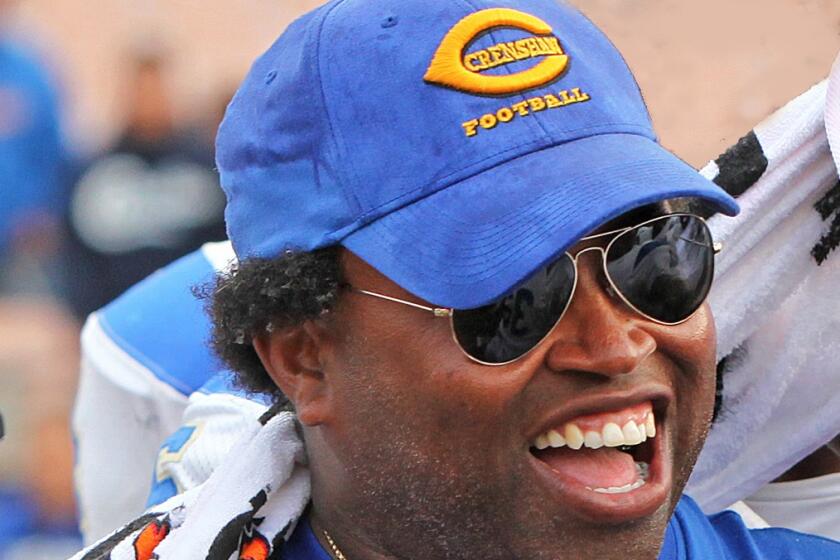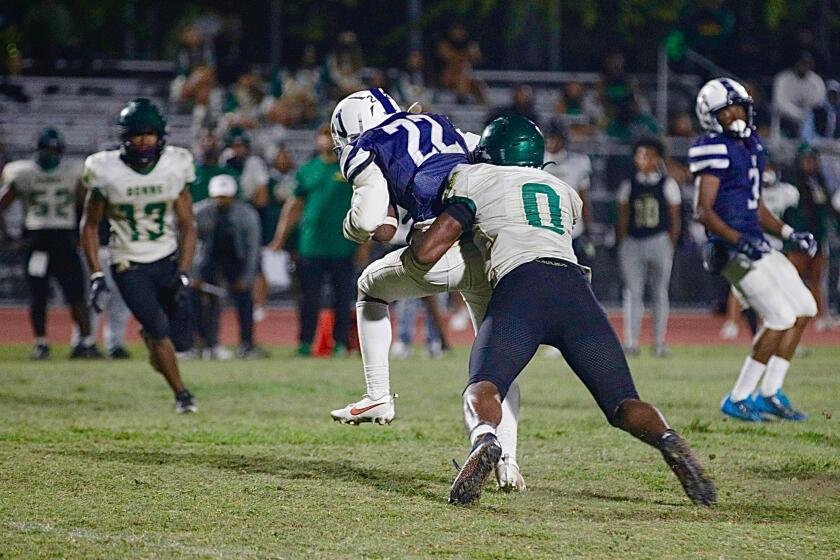Same Old Story for Ivanisevic : Tennis: Second-seeded player upset by Germanyâs Zoecke in first round of U.S. Open.
NEW YORK â The annual Goran Ivanisevic soul-searching, also known as the U.S. Open, got under way Monday.
Ivanisevic, seeded second and second-ranked in the world, went out in the first round to big-serving Markus Zoecke, a 6-foot-5, 190-pound German who entered the tournament ranked 58th.
Zoecke won, 6-2, 7-5, 3-6, 7-5, and by most measures of tennis results, this was a major upset. But then, upon second look, this was Ivanisevic at the U.S. Open, which badly alters the test sample.
Ivanisevic, the sportâs Dr. Strangelove, comes to the U.S. Open each year in need of only one thing to improve his game: a psychiatristâs couch. He has gotten to two Wimbledon finals, but has never made it past the fourth round of the U.S. Open. Perhaps the fact that Sigmund Freud used to live in London is a factor.
Every year since 1989, Ivanisevic has come to Flushing Meadow, faced its demons and been driven out. Others come lacking forehands or great serves. He comes lacking an exorcism.
To his credit, when his stay in his own personal tennis padded cell has mercifully ended each year, he has always addressed the situation head on, refusing to shrink from the blame.
âI did not play tennis today,â he said Monday. âI donât know what I do here. Not only today, every year when I come to the U.S. Open, I donât know what I am doing here, you know. Sometimes I ask myself why I am coming here because . . . I donât know.â
Soon, the self-analysis becomes a flood:
--âAs soon as I come here, it is finished. I donât know why. It is like I am playing--I donât know.â
--âNew York is a great city. I like it here. It is not a problem with New York. It is a problem with me.â
--âI donât know, maybe I should try and play some womenâs tournament next year. But Iâm not sure if I will win that because like this, maybe I win a couple of rounds, but something will happen.â
--âI am trying, but I am lost a little bit. I see these planes (flying over the stadium) and I saw my place on that flight.â
--âI am not thinking, because I am too scared to think.â
Ivanisevic, it must be remembered, is not given to regular thought processes, even when he isnât at the U.S. Open. This is a player whose brain waves tend to run southeast and northwest. For example, a few years ago during the Champions Cup tournament at Indian Wells, he met the press after a match and declared that he would not play again in the desert because, when he went to dinner at night, there were so many old people dining that he was afraid heâd see somebody die of a heart attack.
Some of this, of course, is done for effect. Ivanisevic knows that many of his fellow players are so boring that the press welcomes his frequent zany shows. But Mondayâs show-and-tell was clearly serious.
What Ivanisevic did not give proper testimonial to was the huge serve and baseline slugging game of Zoecke, who was smart enough to know that he had nothing to lose if he just went for it on every shot.
That got him 16 aces, 53 winners, and 28 of 39 points when he came to the net--a 72% average. He didnât lose his serve until 3-4 of the third set, and then on a forehand drive that just barely zipped wide. He fought off six other break-point opportunities and barely failed on a match-point opportunity with Ivanisevic serving at 4-5 of the fourth set, when the Croat hit his best shot of the match, an inside-out forehand winner into the deep corner.
Undaunted, Zoecke held at 5-5, then made use of two lucky netcords and a double fault by Ivanisevic at 5-6 to take the match.
Zoecke, as bland as Ivanisevic is wacky, had never won a match in the U.S. Open before and had only two prior victories, both in the Australian Open, in four years of playing in Grand Slam events. He had to struggle a bit to articulate his emotions.
âI was really happy,â he said. âI donât know, really, but I think I have to see it on TV, maybe, maybe that--yeah, it is a very big win for me.â
For Ivanisevic, the whole thing was just a huge pain. When asked if his recent hip injury had played a role in his defeat, he said: âNo, maybe a brain injury.â
More to Read
Go beyond the scoreboard
Get the latest on L.A.'s teams in the daily Sports Report newsletter.
You may occasionally receive promotional content from the Los Angeles Times.
